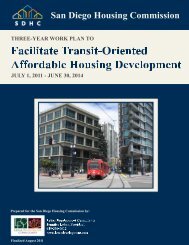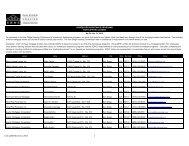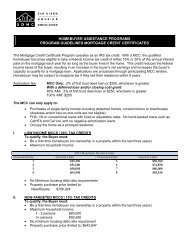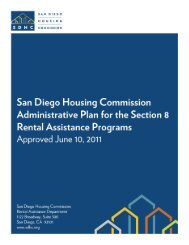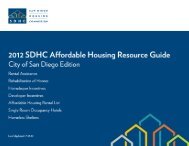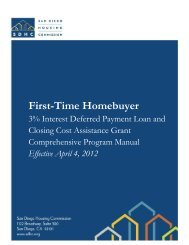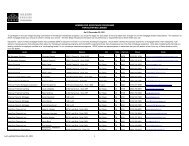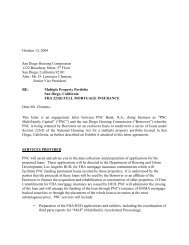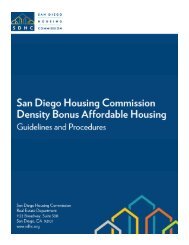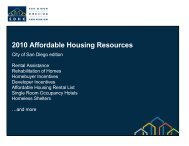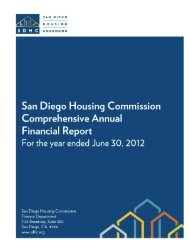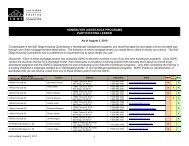Chapter 1 - San Diego Housing Commission
Chapter 1 - San Diego Housing Commission
Chapter 1 - San Diego Housing Commission
You also want an ePaper? Increase the reach of your titles
YUMPU automatically turns print PDFs into web optimized ePapers that Google loves.
<strong>Chapter</strong> 15 – Moving Forward:<br />
<strong>Housing</strong> Choice Voucher Homeownership Program<br />
the one-year anniversary date of full payment of any debt, subject to meeting the other<br />
conditions of good standing.<br />
An applicant must be a “first-time homeowner.”<br />
- To qualify as a “first-time homeowner,” the assisted family may not include any person with a<br />
“present ownership interest” in a residence during the three years before the closing of the<br />
unit for the family. Cooperative membership shares acquired prior to the commencement of<br />
homeownership assistance are exempt from this rule. A single parent or displaced<br />
homemaker who, while married, owned a home with his or her spouse, or resided in a home<br />
owned by his or her spouse, is considered a “first-time homeowner.” Current homeowners<br />
are ineligible.<br />
Other conditions also apply to “first-time homeowner” definition:<br />
- No family member may have a present ownership interest in a second residence while<br />
receiving homeownership assistance.<br />
- If SDHC determines that a disabled family requires homeownership assistance as a reasonable<br />
accommodation, the first-time homeowner requirement does not apply. However, current<br />
homeowners are not eligible.<br />
- SDHC will not commence homeownership assistance for a family if any family member has<br />
previously received assistance under the homeownership option, and has defaulted on a<br />
mortgage securing debt incurred to purchase the home.<br />
An applicant must demonstrate a minimum down payment of at least $3,000 from the eligible<br />
family’s personal resources. This amount must be verifiable savings accumulated over several<br />
months in the family’s bank account(s) and may not be a gift or a loan. For FSS participants who are<br />
eligible for HCV homeownership and who have escrow accounts, they may use up to $1,500 of their<br />
escrow account to satisfy up to half of the $3,000 personal resource requirement. For participants<br />
who have Aspire accounts, the amount they have contributed to this account may be used towards<br />
satisfying the $3,000 personal resource requirement.<br />
An applicant must meet the minimum income standards defined below:<br />
- For a family whose head of household or spouse is an individual that meets the definition of<br />
occupancy disability or elderly, the minimum gross annual income standard is $25,000.<br />
- For eligible FSS/ASPIRE participants and recent graduates, the minimum gross annual income<br />
standard is $30,000. Preference will given to an applicant who is a current FSS/ASPIRE<br />
participant and has been in the FSS/APIRE program for at least one (1) year, or who has<br />
graduated from the FSS/ASPIRE program in the twelve (12) months prior to applying for the<br />
HCV Homeownership Program.<br />
- For non-elderly/non-disabled families, the minimum gross annual income standard is $35,000.<br />
For purposes of program eligibility, welfare assistance may only be counted as income in cases<br />
where the applicant meets the definition of an elderly or disabled family.<br />
The pre-qualified or pre-approved financing amount must be sufficient to purchase housing that<br />
meets HUD <strong>Housing</strong> Quality Standards (HQS).<br />
15-2



